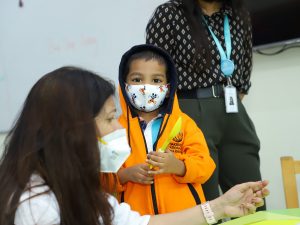How to Support Transition of Early Years to Grade 1 – Oakridge expert says
- 19 May 2022


Change is constant, and reactions to change have become part of daily life for adults. However, for children, the process of change can be a challenging and often daunting experience. That is why teachers and parents must be prepared to help children manage change and guide them through the transition phase.
The transition from the Early Years to Primary can be a lot to handle for a young child. When this transition period approaches, parents have many questions and concerns.
Parents want advice on how to equip their children to tackle these challenges. It is important to note that each child’s processes change in their unique way. For some learners, this transition will be a seamless one and for others, it might involve a level of anxiety, nervousness, and excitement. Transition to Grade 1 is a big step for our little champs. However, their resilience and natural curiosity will contribute to them overcoming this transition phase.

At Oakridge International School Bachupally, we make this transition as smooth as possible for our students. Part of this is preparing our little champs to bridge the gap of the new world filled with possibilities to explore, their new classrooms, get to know their new teachers, and new peers to bond, learn and play with. There must be various factors to be considered when preparing for this transition.
What to be done for a successful transition to Grade 1.
Help your children name their feelings. Change can be exciting and scary. Reassure them that these feelings are normal and part of the change process. Spend quality time with your child for 10-15 min every day and ask them to reflect on their day at school
Read with your child every day. Let them use their reading skills to decode words and use the illustrations to tell their story. What’s more-it is a warm way to spend quality time together. Let your child choose between Fact or fiction. Encourage your child to read a book and challenge with spelling to find new words and meanings together
It is important to set routines at home that your child follows. Have them anticipate what comes next and show their independence as they plan and prepare. They must dress, brush their teeth, and pack bags of basic daily self-chores, practicing daily skills helps in improving confidence resulting in self-independence. Give the child a sense of ownership and design their routines
Clear sleep routines are important for our children’s health, well-being, growth, and neurological development. Set a calm atmosphere as your child prepares for sleep, gentle music, soft lights, and stories are always the best to set the tone for a peaceful night’s sleep. Limit screen time before bed

Your child is unique. Help them to understand that as you acknowledge their strengths and abilities. Look for ways to respond to their interests and focus on processes as they build new skills. Listen to their ideas and let them take the lead as they make suggestions for family play and activity time.
Arrange play dates with friends from the same grade level. Help them develop their social skills as they find ways to play and communicate with each other. Allow them to take turns, negotiate and compromise in play.
Children at this age love appreciation and motivation so remember to acknowledge every small deed that they do immediately it can be in form of rewards or a Pat on the back.
We must make sure that the parents are well informed and equipped to help, guide, and support their children with this transition. Sessions are to be led by our experts from the top international school in Hyderabad and offer an opportunity for parents to get advice, explore strategies, and receive tips on how to help their child cope.

BY
Ms. Nandini Mathur
Head of Early Years Program.
Senior Leadership Team

Hyderabad, Gachibowli

Hyderabad, Bachupally

Visakhapatnam

Mohali
Bengaluru
1 Comments
Well said